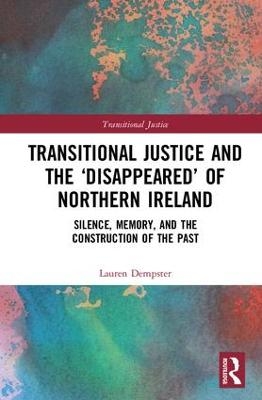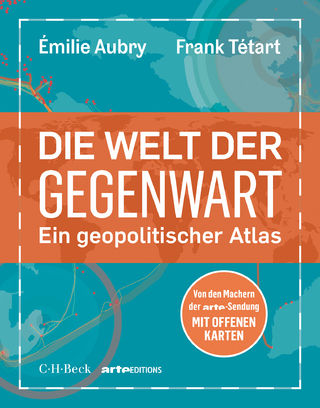
Transitional Justice and the ‘Disappeared’ of Northern Ireland
Silence, Memory, and the Construction of the Past
Seiten
2019
Routledge (Verlag)
978-0-8153-7564-7 (ISBN)
Routledge (Verlag)
978-0-8153-7564-7 (ISBN)
This book employs a transitional justice lens to address the ‘disappearances’ that occurred during the Northern Ireland conflict and the post-conflict response. Despite an extensive literature around ‘dealing with the past’ in Northern Ireland, as well as a substantial body of scholarship on ‘disappearances’ in other national contexts
This book employs a transitional justice lens to address the ‘disappearances’ that occurred during the Northern Ireland conflict – or ‘Troubles’ – and the post-conflict response to these ‘disappearances.’ Despite an extensive literature around ‘dealing with the past’ in Northern Ireland, as well as a substantial body of scholarship on ‘disappearances’ in other national contexts, there has been little scholarly scrutiny of ‘disappearances’ in post-conflict Northern Ireland. Although the Good Friday Agreement brought relative peace to Northern Ireland, no provision was made for the establishment of some form of overarching truth and reconciliation commission aimed at comprehensively addressing the legacy of violence. Nevertheless, a mechanism to recover the remains of the ‘disappeared’ – the Independent Commission for the Location of Victims’ Remains (ICLVR) – was established, and has in fact proven to be quite effective. As a result, the reactions of key constituencies to the ‘disappearances’ can be used as a prism through which to comprehensively explore issues of relevance to transitional justice scholars and practitioners.
Pursuing an interdisciplinary approach, and based on extensive empirical research, this book provides a multifaceted exploration of the responses of these constituencies to the practice of ‘disappearing.’ It engages with transitional justice themes including silence, memory, truth, acknowledgement, and apology. Key issues examined include the mobilisation efforts of families of the ‘disappeared,’ efforts by a (former) non-state armed group to address its legacy of violence, the utility of a limited immunity mechanism to incentivise information provision, and the interplay between silence and memory in the shaping of a collective, societal understanding of the ‘disappeared.’
This book employs a transitional justice lens to address the ‘disappearances’ that occurred during the Northern Ireland conflict – or ‘Troubles’ – and the post-conflict response to these ‘disappearances.’ Despite an extensive literature around ‘dealing with the past’ in Northern Ireland, as well as a substantial body of scholarship on ‘disappearances’ in other national contexts, there has been little scholarly scrutiny of ‘disappearances’ in post-conflict Northern Ireland. Although the Good Friday Agreement brought relative peace to Northern Ireland, no provision was made for the establishment of some form of overarching truth and reconciliation commission aimed at comprehensively addressing the legacy of violence. Nevertheless, a mechanism to recover the remains of the ‘disappeared’ – the Independent Commission for the Location of Victims’ Remains (ICLVR) – was established, and has in fact proven to be quite effective. As a result, the reactions of key constituencies to the ‘disappearances’ can be used as a prism through which to comprehensively explore issues of relevance to transitional justice scholars and practitioners.
Pursuing an interdisciplinary approach, and based on extensive empirical research, this book provides a multifaceted exploration of the responses of these constituencies to the practice of ‘disappearing.’ It engages with transitional justice themes including silence, memory, truth, acknowledgement, and apology. Key issues examined include the mobilisation efforts of families of the ‘disappeared,’ efforts by a (former) non-state armed group to address its legacy of violence, the utility of a limited immunity mechanism to incentivise information provision, and the interplay between silence and memory in the shaping of a collective, societal understanding of the ‘disappeared.’
Dr Lauren Dempster is a Lecturer in the School of Law, Queen’s University Belfast.
Preface, Introduction, 1 ‘Disappearing’ in International Context: Memory, Silence, and the Law 2 The Victims: Mobilisation, the Politics of Victimhood, and Constructing the ‘Disappeared’ 3 The Republican Movement: Rationalising, Leadership, and Resolving the ‘Disappeared.’4 The Community: Rumour, Whispers, and ‘Bystander Complicity’ 5 ‘Quiet’ Transitional Justice and ‘Disappearing’ 6 Acknowledgement, Truth, and the Collective Memory of the ‘Disappeared’Conclusion: ‘Disappearing’ and Transitional Justice – Lessons from Northern Ireland
| Erscheinungsdatum | 24.07.2019 |
|---|---|
| Reihe/Serie | Transitional Justice |
| Verlagsort | New York |
| Sprache | englisch |
| Maße | 156 x 234 mm |
| Gewicht | 453 g |
| Themenwelt | Geschichte ► Allgemeine Geschichte ► Zeitgeschichte |
| Geisteswissenschaften ► Geschichte ► Regional- / Ländergeschichte | |
| Recht / Steuern ► EU / Internationales Recht | |
| Sozialwissenschaften ► Politik / Verwaltung ► Europäische / Internationale Politik | |
| ISBN-10 | 0-8153-7564-6 / 0815375646 |
| ISBN-13 | 978-0-8153-7564-7 / 9780815375647 |
| Zustand | Neuware |
| Informationen gemäß Produktsicherheitsverordnung (GPSR) | |
| Haben Sie eine Frage zum Produkt? |
Mehr entdecken
aus dem Bereich
aus dem Bereich
Gewalt, Umwelt, Identität, Methode
Buch | Softcover (2024)
Spector Books OHG (Verlag)
CHF 49,95


